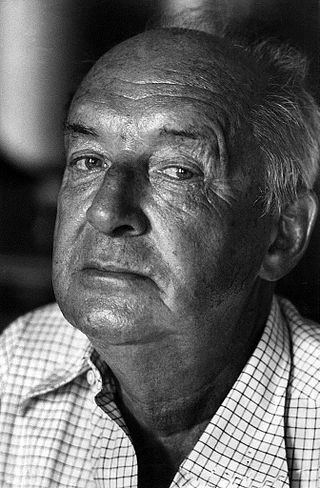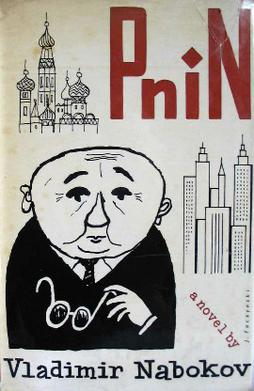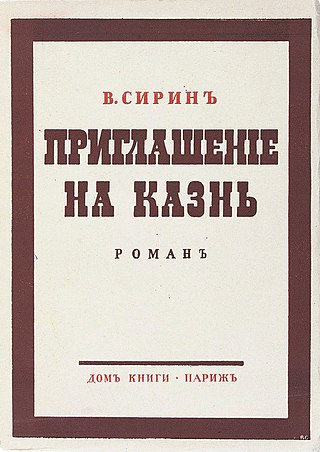Related Research Articles

Vladimir Vladimirovich Nabokov, also known by the pen name Vladimir Sirin, was a Russian-American novelist, poet, translator, and entomologist. Born in Imperial Russia in 1899, Nabokov wrote his first nine novels in Russian (1926–1938) while living in Berlin, where he met his wife. He achieved international acclaim and prominence after moving to the United States, where he began writing in English. Nabokov became an American citizen in 1945 and lived mostly on the East Coast before returning to Europe in 1961, where he settled in Montreux, Switzerland.

Pnin is Vladimir Nabokov's 13th novel and his fourth written in English; it was published in 1957. The success of Pnin in the United States launched Nabokov's career into literary prominence. Its eponymous protagonist, Timofey Pavlovich Pnin, is a Russian-born assistant professor in his 50s living in the United States, whose character is believed to be based partially on the life of both Nabokov's colleague Marc Szeftel as well as on Nabokov himself. Exiled by the Russian Revolution and what he calls the "Hitler war", Pnin teaches Russian at the fictional Waindell College, loosely inspired by Cornell University and Wellesley College—places where Nabokov himself taught.
Ada or Ardor: A Family Chronicle is a novel by Vladimir Nabokov published in 1969.
"The Vane Sisters" is a short story by Vladimir Nabokov, written in March 1951. It is famous for providing one of the most extreme examples of an unreliable narrator. It was first published in the Winter 1958 issue of The Hudson Review and then reprinted in Encounter during 1959. The story was included in Nabokov's Quartet (1966), Nabokov's Congeries, Tyrants Destroyed and Other Stories (1975), and The Stories of Vladimir Nabokov (1995).

Invitation to a Beheading is a novel by Russian American author Vladimir Nabokov. It was originally published in Russian from 1935 to 1936 as a serial in Sovremennye zapiski, a Russian émigré magazine. In 1938, the work was published in Paris, with an English translation following in 1959. The novel was translated into English by Nabokov's son, Dmitri Nabokov, under the author's supervision.
The Real Life of Sebastian Knight is the first English-language novel by Vladimir Nabokov, written from late 1938 to early 1939 in Paris and first published in 1941. A work centred on language and its inability to convey any satisfactory definition, it has been identified as a forerunner of the postmodernist novel.

The Defense is the third novel written by Vladimir Nabokov after he had immigrated to Berlin. It was first published in Russian 1930 and later in English in 1964.
Lolita, My Love was an unsuccessful musical by John Barry and Alan Jay Lerner, based on Vladimir Nabokov's 1955 novel Lolita. It closed in Boston in 1971 while on a tour prior to Broadway.

King, Queen, Knave is the second novel written by Vladimir Nabokov while living in Berlin and sojourning at resorts in the Baltic. Written in the years 1927–8, it was published as Король, дама, валет in Russian in October 1928 and then translated into German by Siegfried von Vegesack as König, Dame, Bube: ein Spiel mit dem Schicksal. Forty years later the novel was translated into English by Nabokov's son Dmitri, with significant changes made by the author. A film adaptation only loosely based on the novel followed in 1972.
"Lolita" is an English-language term defining a young girl as "precociously seductive." It originates from Vladimir Nabokov's 1955 novel Lolita, which portrays the narrator Humbert's sexual obsession with and victimization of a 12-year-old girl whom he privately calls "Lolita", the Spanish nickname for Dolores. Unlike Nabokov, however, contemporary writers typically use the term "Lolita" to portray a young girl who attracts adult desire as complicit rather than victimized.
"Bachmann" is a short story written in Russian by Vladimir Nabokov under his pen name, Vladimir Sirin, in Berlin in 1924. The story details a three-year love affair between the titular Bachmann, a celebrated pianist, and Mme. Perov, a married woman.
"The Potato Elf" is a short story written in Russian by Vladimir Nabokov in Berlin where it was first published in the émigré daily Rul in 1929 and then included in the 1929 collection Vozvrashchenie Chorba. It was initially translated into English by Serge Bertensen and Irene Kosinska for publication in Esquire in 1939, and reprinted in A Single Voice. Nabokov then retranslated the story and included it in A Russian Beauty and Other Stories in 1973.

Lolita is a 1955 novel written by Russian-American novelist Vladimir Nabokov that addresses the controversial subject of hebephilia. The protagonist is a French literature professor who moves to New England and writes under the pseudonym Humbert Humbert. He describes his obsession with a 12-year-old "nymphet", Dolores Haze, whom he kidnaps and sexually abuses after becoming her stepfather. Privately, he calls her "Lolita", the Spanish diminutive for Dolores. The novel was originally written in English, but fear of censorship in the U.S. and Britain led to it being first published in Paris, France, in 1955 by Olympia Press.
"Details of a Sunset" is a short story by Vladimir Nabokov written in Russian under his pen name Vladimir Sirin in Berlin in 1924.
"Sounds" is a short story by Russian American author Vladimir Nabokov originally written in Russian in September 1923.
"The Wood-Sprite" is a short story by Vladimir Nabokov, originally published in Russian in 1921. It was his first published story.
"Orache" is a short story by Russian American author Vladimir Nabokov originally published in Russian in 1932.
"The Passenger" is a short story by Russian American author Vladimir Nabokov originally published in Russian in 1927.

A Guide to Berlin is a 2015 novel by Australian author Gail Jones. With the same name as Vladimir Nabokov's short story A Guide to Berlin, Jones' novel follows the main character, a young Australian woman named Cass, as she travels to Berlin and meets with five other travellers in the city. The six members form a literary group, all inspired at one point in their lives by Nabokov's life and works, and share their personal stories which they call speak-memories. Towards the end of the novel, a moment of violence within the group changes the direction and tone of the story.
"That in Aleppo Once..." is a short story written by Russian-born author Vladimir Nabokov (1899–1977). First published in Atlantic Monthly in 1943, the story takes epistolary form, with an unnamed narrator describing his recollections of himself and his wife's deteriorating relationship while fleeing German occupation during Case Anton. The narrator reveals to his correspondent the likelihood his wife was not real, examining this premise during the account of events.